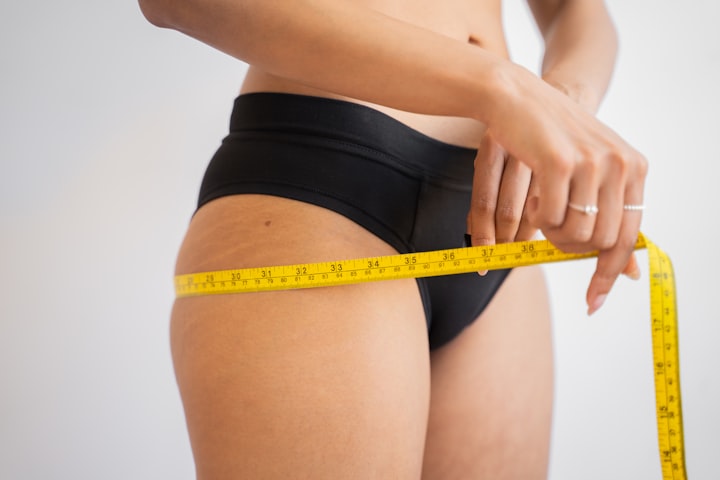Your Weight Is Not Your Wellness
why losing 150+lbs and becoming a personal trainer did not solve any of my problems
Weight loss is big business. I did not join the fitness industry to exploit weakness, though, I became a personal trainer to try to save myself, after a lifetime of being overweight. In doing so, I came to realise I owed my clients much more than just meal plans and workouts.
Understanding the emotional experience of others was crucial to my work. The times I failed to do so, are the times that, professionally speaking, I fell short. The most meaningful client relationships I made have been with people who have echoed my own experiences in one way or another, which at first might sound narrow-minded, but upon deeper consideration, makes perfect sense. It's a lot easier to empathise with why a 300lb woman can't perform a certain exercise when you have lived the experience of attempting to stand up and sit down at that weight yourself. It becomes a lot easier to convince someone resistant to food accountability protocols of the need to track when you can demonstrate ways in which you can succeed or fail through anecdotal, but lived, evidence. Motivating others isn't about a textbook. It's not all learning the names of muscles and repeating them, ad infinitum. People are so perfectly similar and also unique, in that they are resolutely certain that their pain will never be understood. But, honestly, I really did get it. Not because I'm psychic, but because I've been there. You don't become five, six, seven, or twenty stone overweight because you 'like food' or because you 'can't turn down a biscuit'; it's because food is there when something else isn't, or to suffocate an unresolved emotion or trauma. Eat less and move more? Sure, this is great basic advice, but it's not enough when you're actively fighting with yourself about every morsel you are consuming. It's fine advice for the slightly overweight, or if you piled it on after reducing activity levels, had an injury, or just fall into the 'slightly twitchy about biscuits' category. But if you have a serious, unresolved, weight problem that makes your head scream with conflict, and makes you feel powerless in your actions, no amount of pragmatism or fat-shaming is going to pull you from that place on a short-term, or a permanent basis. Sure, you can drop a bit here and there, but will the long term trajectory of your weight chart go down? You'll already know the answer if you're in that place. You've already fought years to feel different, to look different, to try to be the person you feel like inside. But all those years of fighting wear you down, and give way to feelings of low self-esteem, further unhealthy coping habits, and the creeping thoughts that maybe this will never change.
I totally get it. Remember, you can change. You will change - but first everything needs reframing. Eating itself seems so rarely to be the true issue. Shifting perspective from the symptoms to the cause became a crucial refocus. Binge eating, comfort eating, eating without hunger, undereating, denial, deprivation, and rebound: they're all symptoms of deeper issues. Reverse the symptom and you grant only a stay of execution to what's essentially a foregone conclusion. Address the cause of a struggle with food, and outcomes become radically different. It is significantly more difficult than forcing down a metric shedload of meal replacement shakes, but, it will prove to be so much more worthwhile.
I was asked occasionally about the positioning of my business and the way that some people might see it as a little oxymoronic. I would tell clients to be body positive whilst simultaneously helping people change their body shapes. This doesn't sit comfortably with some, as they view the two things as dichotomous, polar opposites on the health and wellbeing scale.
I don't view body positivity and the desire to change as mutually exclusive. You don't have to hate yourself to want to be healthier. You don't have to be in a cycle of punishment in order to want to wear a smaller, or a larger, dress size. You don't have to loathe your aesthetic self to want to build muscle. All physical change can be manifested with an attitude of self-care and consideration to yourself.
It's also important to remember that what makes you happy and meets your needs one day, might change on another. Just because you are happy today at a certain size or fat percentage doesn't mean your goals can’t, or won't, be adjusted in six months or in a year or two. You can value and appreciate your body even as you transform it, in the same way as you can even if you choose not to.
Any change you make can be done positively, and it can be done from a place of self love. Self loathing causes rebound, distress, and is often a less constructive approach. Changes that are rooted in a dislike of one's self can come unstuck in patterns of self sabotage, lack of clarity, or simply just run out of steam. A more body positive approach will build on well established self esteem and can prove to be a strengthening and affirming process.
What's important is not that you are changing yourself, you are simply changing your body. It's just a box that you come in. You can repackage all you like - as long as you're satisfied with the contents, the external is window dressing. If the inside disgusts you, the chances are you won't realistically be able to disguise the packaging that much.
My point is this: focus on what's important and feel free to change whatever you feel is out of alignment. Never confuse what makes you, you, with what you look like. You can change anything, or you can change nothing, but whatever action you take, I would always advise not making it through fear or hate.
Authenticity is something I work on every day; I guess it's one of my personal quests, to live a life as much in as authentic a way as possible. I've actually found it incredibly difficult to do this at times. One of the major problems I've encountered was working in the fitness industry, and the way I was expected to do it. Running a fitness business, you're meant to follow this seasonal advertising programme based on fearmongering and body-shaming. I'm meant to tell you how you need a 'beach body' (this phrase makes me cringe more than you can imagine), how you should lose those Christmas pounds, how a new year is ready for the new you... and in all honesty, I just did not want to.
If you want to change shape or lose weight, do it because of your reasons, not because the kids have gone back to school or because an advert tells you that you've messed up again this festive season. Forget all of that. I can help you get fit if you want to get fit. I could help you drop a few pounds if you want help with nutrition and strategy. But I'm absolutely done with telling you that you should. I became so disillusioned with the mixed messages that the fitness industry conveys and this ridiculous insistence that there are fixed times of the year that are acceptable to either neglect, or aggressively manipulate or take care of, your body and your wellbeing.
Some people want to eat biscuits until May, and that's fine. Surely, we all know, deep down, January 1st is relentlessly arbitrary, and putting pressure on yourself to do something against your own will, will almost certainly not result in enormous personal success.
I know this probably isn't what a personal trainer should be writing to inspire you with. This might seem illogical, professionally speaking. Maybe you started reading this for a lengthy list of exercises or action points. But, every day, I would tell my clients I just wanted them to be well. If that meant not losing weight, I'd rather they didn't. If that meant resting rather than exercising, I would send them home. I would rather my professional legacy was one of improving wellness and growing happiness. Anyone can teach the principles of fitness or nutrition once they've been learned, and I was more than happy to do that along the way. I just could not bully someone into thinking that a 'beach body' is something they needed, because it's not. You need a body that functions well into old age, that does the things you love doing, and that performs the tasks you ask of it. You need to look after your body, not find another thousand reasons to hate it. Don't hold both your mental and your physical health to ransom for this thinly veiled peer pressure ridiculousness that you probably should have left behind you in high school. Look inside yourself for your motivation, don't fall for a guilt trip. Set your sights on the things you want to achieve, they're the only things that matter.
I reached the point where I would not tout for business by feeding insecurity. I wanted to make progress, not pain. Let’s get off this train, even if it means we have to walk.
Where I started: in the beginning
We all have a truth that either builds us or breaks us; the extent to which either occurs is dependent on its emotional hold over you. You can own it, or it will own you. So many disordered behaviours are led by our secret truths, the things that linger over us from yesteryear, dictating our choices as we naively believe we successfully run to escape them... only to find they're waiting to trip us up around the next corner.
Something I've really been struggling with recently is this exact issue of disordered behaviour, unconstructive habits, and cycles of self-sabotage. I'm haunted by a sense of failure, feelings of inferiority, and an overwhelming belief that I'm an impostor in my own life. Are any of these things ‘real’? Probably not. Do they feel crippling? Undoubtedly, and resoundingly, yes. All are symptoms of perfectionism, but without the payoff of being excellently disciplined in any area. I’m not proud to admit that I’ve been envious of friends with painful OCD for cleaning, or that I’ve secretly torn myself apart with jealousy towards friends with significantly damaging (lack of) eating habits. Towards these mental illnesses, my own mediocrity seems to pine, some days. To be so ‘good’ at any kind of extreme behaviour that your entire life is affected, even threatened, by it… well, that seems beyond the realms of even my most dementedly wild aspirations.
A projected persona of boldness, brashness and invincibility: that was me. I lost track of the number of times that people have told me that they were ‘kind of scared’ of me to start with. Exuding confidence to the point of overbearingness. Forcing myself to the centre of attention at every opportunity. All of this for one single reason: to find some kind of validation, but only ever through the feedback or opinions of others. Masking all the insecurity, anxiety and fear becomes the routine. Coping, rather than resolving. Disguising, rather than moving forward. Spending my life at a costume party instead of facing what is in the mirror.
The fact is, most of us are pretty good at identifying our flaws. We might distract ourselves by fixating on things that are more like symptoms than causes, but eventually return to the place where we can’t run any further.
From the age of 19, I knew I had a problem with alcohol. I can tell you a ton of stories about all the times I kind-of-sort-of-half-attempted to address it; I can tell you even more about the times that it seemed like a better idea to ignore the issue; it’s only now that I might be honest and actually tell you how it has torn me apart. And, by that, I mean the number of times it's hurt others, put me at risk, or nearly killed me. It wasn’t until I was 40 that I addressed the issue once and for all, and quit drinking.
From the age of 15, I knew I had a problem with food. Not half as dramatic as an addiction to something high risk. Not as 'glamorous' as the non-stop chaos that goes along with blackouts and disaster. Eating yourself to death is a slow, painful way to die. Years of bleak, wallowing, caged sadness. A painful, guilt-ridden life that becomes physically slowed to the point of inescapable terror. Moments of brief self-loathing turn into months and years of creeping, growing horror, spent caught in a downward spiral, trapping you in the realisation that you might never make it back. The bigger you become, the further you fall into the acceptance that change might be even less possible by the day. At 21 stone, I honestly never thought I would, or could, exist in the world as a 'normal', 'acceptable' human being. One thing I can guarantee is if you haven't experienced any kind of disordered relationship with food, you're probably never going to understand it. Fat? Eat less, move more. Thin? Just eat more. It's so simple, right? Massive eyeroll over here. Nobody ends up either extremely fat or extremely thin without needing to resolve something in their life that falls outside the perceived remit of 'diet and exercise'.
We all have our demons. We all have our secrets, our pain, our fears. I absolutely promise you that, without confronting these, you will never escape them. The freedom from all the things that hold us back is rooted in our ability to reflect, to learn and to change. Change is not only possible, it is unavoidable. It's just that if you aren't actively trying to change things in the direction you want them to go, then you're simply riding an unstoppable rollercoaster with your eyes closed.
Every day we aren't working for our goals, we're working against them. I'm talking about actual, pragmatic, constructive work. Whether that work requires a specific action (the anorexic trying to eat), or inaction (the addict trying to abstain), you need support, you need a plan or framework, and you need a goal. It’s good to start with an honest and truthful acknowledgement, but don’t just stop there, languishing for decades in unending spirals of denial and flawed, repeated, coping mechanisms. Face it, own it, change it. Little goals, big goals. You're either all in, or you're going nowhere.
Where I started: my twenties
I have been 300lbs, and I have weighed less than 120lbs. I have worn a size 30 dress and a size 6 dress. A 44FF bra, and a 32B bra. This is really important for me to stress because all too often we are being told that thin equals healthy. It does not. Thin can be incredibly unhealthy, regardless of how ‘good’ somebody might look.
By no means am I trying to tell you that 300lbs is healthy. Let me tell you what it is. It is constant joint pain, never-ending sweating and boils, yeah that's right. BOILS. It is always having to shower and never quite being able to reach anything that you really need to wash. It's sitting in a chair and your belly reaching your knees. It's hearing your family talking about you in hushed tones. It's having strangers insult you in the street. It's not fitting in the plane seat and being moved by the stewardess. It's fitting into a different plane seat and having to use a seat-belt extender. It's being too ashamed to eat in public. It's having to ask your best friend to paint your toenails (thanks Emma). It's giving up on your toenails and deciding never to leave the house. It's both the by-product and a cause of giving up on your life.
I spent a decade putting on that much weight, at my biggest in my mid-twenties, when I made a snap decision one day to change. I had a 'last supper' of 2 chocolate chip cookies, and I vowed tomorrow would be different. 11 months later, I'd lost 150lbs with low calorie meal replacements. I was thin. Well, thinner. My mind had not caught up with my body. I was still picking up the largest size in the shop, still avoiding looking in the mirror, still envious of my petite friends. I was still not good enough, not pretty enough, not normal enough. I was devastated emotionally to find nothing I'd sought at what I thought would be the end of my journey. So, I reduced my intake further, in an effort to lose more weight. I kept going. Six months later, a size 8 from any shop was too big. Still, I was not perfect. By this point, my hairline had begun to recede. My skin was grey - so much so, I always had to wear a maximum coverage foundation. I had to sleep a minimum of 14 hours a day because my energy levels were so low. Still, I was not perfect. I did 10 hours of martial arts every week and walked everywhere. I was exhausted, strung out, desperate and still not fucking perfect. I was freezing all the time. Four tops in the height of summer, heater under my desk in winter. The stunning hourglass figure I imagined hiding under all the fat simply wasn't there. My tiny frame was narrow-hipped, slim-shouldered, lacking any of the curves that body fat would have provided. No breasts, just padding. No cute butt, no hips, not even really any waist. Straight up and down. All that work, all that horrific, exhausting, never-ending effort and I was not perfect. Not only that, but I was now scared to go anywhere. This terrifyingly diminutive stature afforded me no protection against the world. This body was foreign, it was frightening and it was not even right. Size fucking 6 (from a 28). 120lbs (from 300) and I was more miserable with my body than I'd ever been. My own mother didn't recognise me. Nobody did. Some people were too scared to ask about my weight loss because they presumed I was seriously ill. Others had no qualms, bestowing constant attention on me, congratulating me for my efforts, my strength, my discipline. And that's how I self-destructed. Every compliment burned painfully, reminding me of my fraud. They thought I was perfect, they thought I was a swan; I felt like I was the ugliest duckling of all, fooling them all in an elaborate costume woven from sadness and lies.
Until, one day, it became too much. I ate again, and I could not stop.
The yoyo years followed; little progress, but far less pain. Whether it be body fat or muscle, around 170lbs was a place my body felt happy for a while, a safe contentment. A large size 12 was a happy aspiration when I was carrying a few extra pounds. It's where my spirit comfortably seemed to align with my body; where I enjoyed the space I filled. Without bouncing from it and to it a couple of times, I would not know this. Without the agony of being in the wrong place, I may not have found the right one. However, without accepting there was no perfection at either end of the spectrum, I would never have found those moments of peace. The obsession that drove me out of obesity and into excessive control was one that had no happy ending. I put my life on hold while I waited to reach perfection, and that moment simply never came. But that ‘happy place’, too, was a false comfort. Unafraid of the world, safe from the threats I perceived within it, a squishy marshmallow heaven: an unreal place of mediocrity where I kept myself safe, and unable to appreciate or pursue my physical or mental potential.
So, that's why you'll very rarely see photos of me at my thinnest, from that brief period in my twenties. I know that thin does not necessarily equal healthy and it most certainly doesn't equal happy. I saw both places in rapid succession - excessive control and its gluttonous opposite - and neither is an existence I would wish upon anybody.
In my role as a personal trainer, I was often asked what the quickest way to lose weight is, or variations on that theme. Some people would get cross because I did not recommend meal replacement diets or slimming clubs. Some did not understand why I tried to find out what was making them unhappy first. Some would cry. Some just wanted me to tell them where to buy thermogenics.
I sat there, nearly comfortable in my skin, as imperfect as I was (and still am), and I tried to help them in a way that would benefit their entire lives. Wellness is more than one size, it's more than a curve on a chart; misery is more than a numerical threshold. There are a thousand trainers who will try to sell perfection and it is ultimately your choice if you want to buy into that.
I continue to try to listen to every body I have lived in. I used to feel my purpose was to help create wellness in others; I only ever wanted my clients to be healthy, fit and energised, and ultimately find that place where they no longer questioned if they are good/thin/strong enough. I wish I could have made them all believe they are most definitely enough, in every way. Even in the moments where they questioned how anyone else could possibly accept them: I honestly, one thousand times, cannot say loud enough: you are so much more than you can possibly imagine.
About the Creator
Joanna McLoughlin
/// fiction with a dark edge ///
\\\non-fiction on the wellbeing tip\\\
CW/TW for my fiction work: often contains violence and may contain references to trauma/dv/assault







Comments
There are no comments for this story
Be the first to respond and start the conversation.